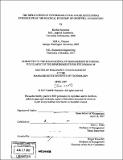| dc.contributor.advisor | Ross L. Watts. | en_US |
| dc.contributor.author | Ramanna, Karthik | en_US |
| dc.contributor.other | Sloan School of Management. | en_US |
| dc.date.accessioned | 2008-03-27T18:27:23Z | |
| dc.date.available | 2008-03-27T18:27:23Z | |
| dc.date.copyright | 2007 | en_US |
| dc.date.issued | 2007 | en_US |
| dc.identifier.uri | http://hdl.handle.net/1721.1/40952 | |
| dc.description | Thesis (Ph. D.)--Massachusetts Institute of Technology, Sloan School of Management, 2007. | en_US |
| dc.description | Includes bibliographical references (leaves 53-55). | en_US |
| dc.description.abstract | I study the evolution of Statement of Financial Accounting Standard (SFAS) # 142, which uses unverifiable fair-value estimates to account for acquired goodwill. I find evidence consistent with the Financial Accounting Standards Board (FASB) issuing SFAS 142 in response to political pressure over its proposal to abolish pooling accounting: pro-pooling firms can be linked-via political contributions-to U.S. Congresspersons pressuring the FASB on this issue. This result is interesting given the proposal to abolish pooling was due in part to the Securities and Exchange Commission's concerns over pooling misuse. I also find evidence consistent with lobbying support for SFAS 142 increasing in firms' discretion under the standard. Agency theory predicts this unverifiable discretion will be used opportunistically. The results highlight the potential costs of unverifiable fair-value accounting. | en_US |
| dc.description.statementofresponsibility | by Karthik Ramanna. | en_US |
| dc.format.extent | 80 leaves | en_US |
| dc.language.iso | eng | en_US |
| dc.publisher | Massachusetts Institute of Technology | en_US |
| dc.rights | M.I.T. theses are protected by
copyright. They may be viewed from this source for any purpose, but
reproduction or distribution in any format is prohibited without written
permission. See provided URL for inquiries about permission. | en_US |
| dc.rights.uri | http://dspace.mit.edu/handle/1721.1/7582 | en_US |
| dc.subject | Sloan School of Management. | en_US |
| dc.title | The implications of unverifiable fair-value accounting : evidence from the political economy of goodwill accounting | en_US |
| dc.type | Thesis | en_US |
| dc.description.degree | Ph.D. | en_US |
| dc.contributor.department | Sloan School of Management | |
| dc.identifier.oclc | 212628191 | en_US |
